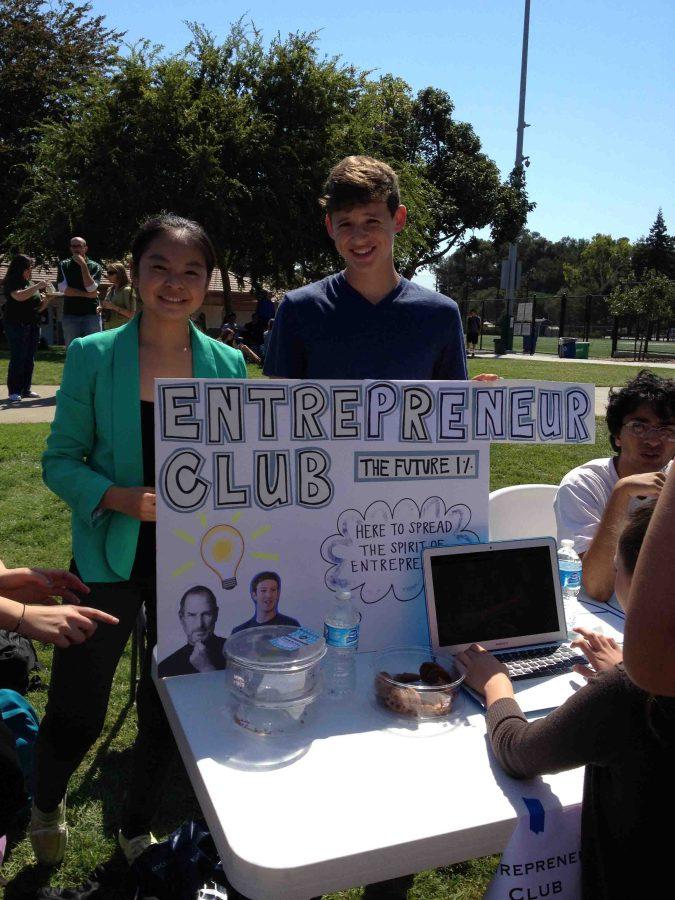Entrepeneur club revives after two-year absence
Courtesy of Paly ASB
Entrepreneur Club president, Allison Zhang, and vice president, Payton Dwight, advertise at Club Day 2013 on Sept. 13. The club was restarted after a two-year hiatus.
Featured in the New York Times and numerous online blogs, the Palo Alto High School Entrepreneur Club looks forward to educating high school students about building start-up businesses and framing entrepreneur ideals. The club was led two years ago by seniors who had been planning their own businesses; however, due to lack of members, they were unable to carry the legacy of the club. Economics teacher Debbie Whitson and sophomore Allison Zhang have restarted the club and are reaching out to more dedicated members to ensure a lasting success.
“The basic direction is that we want our member[s] to develop innovative business ideas and help them make it into a reality by helping them produce business models and make business plans and execute those ideas,” Zhang said. “I know a lot of people who have business ideas, but unfortunately they don’t have the tools or people to fine tune their ideas and make them into reality.”
Zhang, the new club president, was interested in entrepreneurship after learning about her father’s successful supermarket business in his native China.
“After his success in China, my dad always tried to get me to learn more about entrepreneurship, and I guess I started this club because of it,” Zhang said.
Much like her predecessors, Zhang encourages her club members to attend weekend conferences to learn more about startups, as she herself
One of the club’s first speakers, Bryan Dunmire, co-founder and CEO of Red Line Labs, spoke to the club about his experience with entrepreneurship and the values of it in the Silicon Valley. After graduating from Harvard University, Dunmire and a fellow roommate Justin Butler created Red Line Labs to make different mobile applications to alleviate some of the daily problems in many American’s lives. Their most recent application, WakeMe, is designed to make mornings more bearable, as users can share videos or interact with others on the social media while getting out of bed.
Dunmire believes that learning entrepreneurial skills in high school will greatly help students in developing their own businesses in college and work.
“If you look at what people are doing after colleges now, more and more people are not going to the massive companies and are trying to succeed on their own,” Dunmire said. “Being able to think like an entrepreneur and take ideas, own them, fail at them and try again, are skills so important to life in general and we don’t get enough practice in high school now. But if we learn them now, they will serve us greatly in the future.”
Moreover, startups created by young entrepreneurs are allowing for more jobs to be created and filled in the marketplace. In other words, people in the current generation will be employed around 20-30 jobs in comparison with 10 jobs from last generation.
“My parents had around seven different jobs, and our generation might have 20 jobs, which shows that we are never satisfied where we are at, and that is where entrepreneurship comes in because it is the ultimate challenge,” Dunmire said, “Is you yourself come up with something that can not only sustain your living, but give other people jobs and provide some sort of new of utility to our world.”
However, from a high school student’s point of view, starting a business may have numerous trade-offs and opportunity costs such as lack of time to study for exams and do homework.
“I think it’s a lot to expect from students,” Whitson said. “But in college, if you knew more about how to think like an entrepreneur, you would be able to take advantage [of more opportunities]. It’s like you’re preparing for the next step.”
Nonetheless, the club sees that numerous students are continuing to foster new business ideas and are determined to help students see the potential of making their ideas into realities. The club believes that because people are more informed than they used to be, entrepreneurship is a growing trend in today’s society as people continue to develop ideas that will not only help them gain monetary value, but also help create products that can benefit their communities and new entrepreneur skills
“Though people may not be involved in internships or startups now, they will be ready and have a foundation of business,” Whitson said.
Your donation will support the student journalists of Palo Alto High School's newspaper

